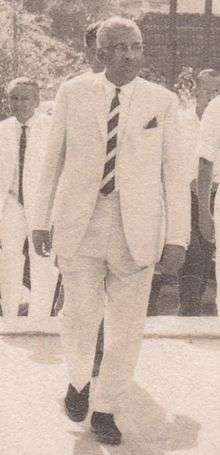Ceylonese parliamentary election, 1952
| | |||||||||||||||||||||||||||||||||||||||||||||||||||||||
| |||||||||||||||||||||||||||||||||||||||||||||||||||||||
| |||||||||||||||||||||||||||||||||||||||||||||||||||||||
| |||||||||||||||||||||||||||||||||||||||||||||||||||||||
General elections were held in Ceylon (now Sri Lanka) in 1952.
Background
Prime Minister D.S. Senanayake died in March 1952, and was succeeded by his son, Dudley. The national wave of mourning for Ceylon's first prime minister greatly boosted the UNP's fortunes.
The 1952 election was the first contested by the Sri Lanka Freedom Party, which had broken away from the UNP on a platform of Sinhala nationalism, and the Illankai Tamil Arasu Kachchi (Federal Party), which split from the All Ceylon Tamil Congress over joining the UNP government.
Results
Because the estate Tamils had been stripped of their citizenship by the Senanayake government, the Ceylon Indian Congress, which most of them had supported, was eliminated from Parliament and the Lanka Sama Samaja Party lost seats. The UNP won a majority, mainly at the cost of the CIC and the LSSP.
| Party | Candidates | Votes | % | Seats | |
|---|---|---|---|---|---|
| United National Party | 81 | 1,026,005 | 44.08% | 54 | |
| Sri Lanka Freedom Party | 48 | 361,250 | 15.52% | 9 | |
| Lanka Sama Samaja Party | 39 | 305,133 | 13.11% | 9 | |
| Communist Party of Ceylon / Viplavakari Lanka Sama Samaja Party | 19 | 134,528 | 5.78% | 4 | |
| All Ceylon Tamil Congress | 7 | 64,512 | 2.77% | 4 | |
| Illankai Tamil Arasu Kachchi | 7 | 45,331 | 1.95% | 2 | |
| Ceylon Labour Party | 5 | 27,096 | 1.16% | 1 | |
| Republican Party | 9 | 33,001 | 1.42% | 0 | |
| Buddhist Republican Party | 3 | 3,987 | 0.17% | 0 | |
| Independents | 88 | 326,783 | 14.04% | 12 | |
| Valid Votes | 306 | 2,327,626 | 100.00% | 95 | |
| Rejected Votes | |||||
| Total Votes Polled | |||||
| Total Electors Polled[lower-alpha 1] | 2,114,615 | ||||
| Registered Electors | 2,990,912 | ||||
| Turnout | 70.70% | ||||
Notes
- ↑ Total electors polled is less than total votes polled due to multiple-member seats where electors can cast more than one vote.
References
- ↑ "Table 32 Parliament Election (1952)". Sri Lanka Statistics. 10 February 2009.
- "Result of Parliamentary General Election 1952" (PDF). Department of Elections, Sri Lanka. Archived from the original (PDF) on 4 February 2016.
- "1952 General Election Results". LankaNewspapers.com.
- "Table 32 Parliament Election (1952)". Sri Lanka Statistics. 10 February 2009.
- Rajasingham, K. T. (10 November 2001). "Chapter 14: Post-colonial realignment of political forces". Sri Lanka: The Untold Story. Asia Times.

.jpg)